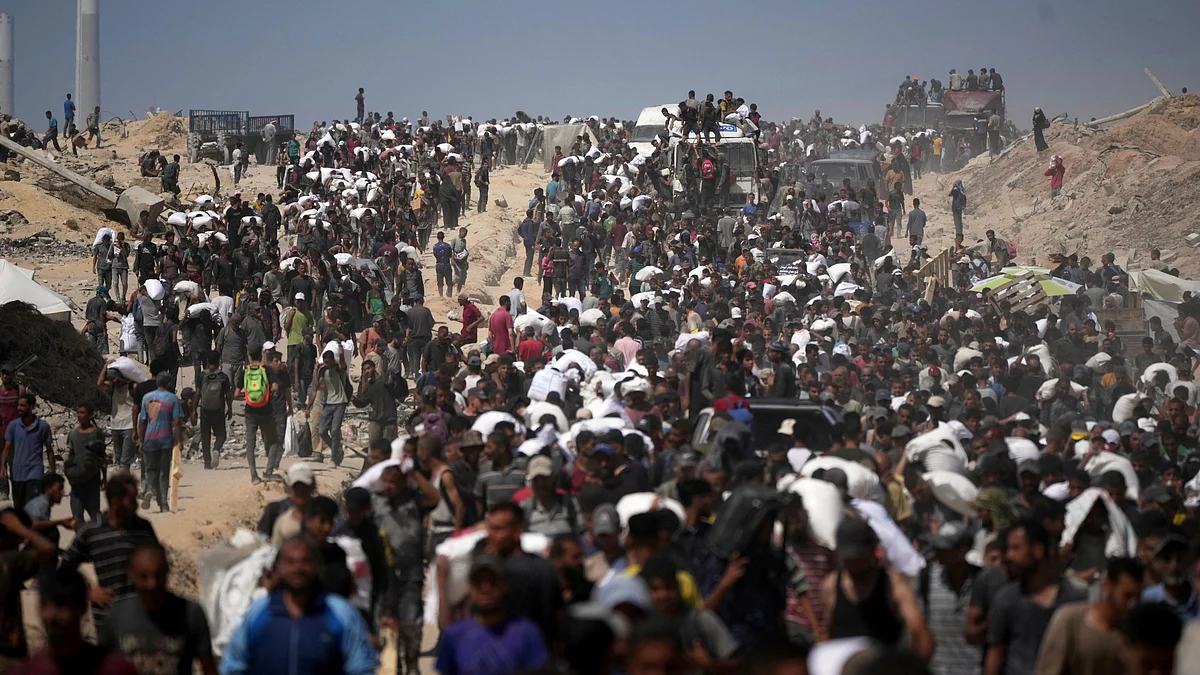Israeli minister visits contentious holy site as more Gazans killed seeking aid
The area, which Jews call the Temple Mount, is the holiest site in Judaism and was home to the ancient biblical temples

A far-right Israeli minister visited and prayed at Jerusalem's most sensitive holy site on Sunday, 3 August, triggering regional condemnation and fears that the provocative move could further escalate tensions. The visit came as hospitals in Gaza said 33 more Palestinians seeking food aid were killed by Israeli fire.
With Israel facing global criticism over famine-like conditions in the besieged strip, Itamar Ben-Gvir's visit to the hillside compound threatened to further set back efforts by international mediators to halt Israel's nearly two-year military offensive in Gaza.
The area, which Jews call the Temple Mount, is the holiest site in Judaism and was home to the ancient biblical temples. Muslims call the site the Noble Sanctuary. Today, it is home to the Al-Aqsa mosque, the third-holiest site in Islam.
Visits to the site by Israeli officials are considered a provocation across the Muslim world and openly praying violates a longstanding status quo. Jews have been allowed to tour it but are barred from praying, with Israeli police and troops providing security. Israeli Prime Minister Benjamin Netanyahu's office said after Ben-Gvir's visit that Israel would not change the norms governing the site.
Ben-Gvir visited following Hamas' release of videos showing two emaciated Israeli hostages. The videos caused an uproar in Israel and raised pressure on the government to reach a deal to bring home the remaining 50 hostages who were captured on 7 October 2023, in the Hamas-led attack that triggered the war.
Ben-Gvir called for Israel to annex the Gaza Strip and encourage Palestinians to leave, reviving rhetoric that has complicated negotiations to end the war. He raged against a video that Hamas released on Saturday of 24-year-old hostage Evyatar David, showing him emaciated in a dimly-lit Gaza tunnel, and called it an attempt to pressure Israel.
Ben-Gvir's previous visits to the site have prompted threats from Palestinian militant groups. Clashes between Israeli security forces and Palestinian demonstrators in and around the site fuelled an 11-day war with Hamas in 2021.
Sunday's visit was swiftly condemned as an incitement by Palestinian leaders as well as Jordan, the Al-Aqsa mosque's custodian, Saudi Arabia and Turkey. Houthi rebels in Yemen said they fired three drones at Israel; Israel's military said a "suspicious aerial target launched from Yemen" was intercepted.
Videos of hungry and suffering Israeli hostages
The videos -- released by Hamas and Islamic Jihad, the second-largest militant group in Gaza -- triggered outrage across the Israeli political spectrum after the hostages, speaking under duress, described grim conditions and an urgent lack of food. Tens of thousands rallied in Tel Aviv on Saturday, calling on Israel and the United States to urgently pursue the hostages' release after suspending ceasefire talks.
Israel's mission to the UN said it requested an emergency meeting of the UN Security Council on the hostages, which will take place on Tuesday.
"They do not want a deal," Israeii Prime Minister Benjamin Netanyahu said of Hamas. "They want to break us using these videos of horror."
His office said it spoke with the Red Cross to seek help in providing the hostages with food and medical care. The International Committee of the Red Cross said it was "appalled by the harrowing videos" and called for access to the hostages.
Hamas' military wing said it was ready to respond positively to Red Cross requests to deliver food to hostages, if humanitarian corridors are opened in a "regular and permanent manner" in Gaza.
Right-wing politicians who oppose deals with Hamas said the videos reinforced their conviction that Hamas must be obliterated.
Deadly chaos around food-distribution points
The Palestinian Red Crescent Society said a staff member was killed when Israeli forces shelled its office. Israel's military said it was reviewing the claim. The Red Cross called it an "outrage" that so many first responders have been killed in the war.
Hospital officials said Israeli forces killed at least 33 Palestinians seeking food on Sunday, and witnesses described facing gunfire as hungry crowds surged toward aid sites.
Desperation has gripped the Palestinian territory of more than 2 million (20 lakh), which experts warn faces "a worst-case scenario of famine" because of Israel's blockade. No aid entered Gaza between 2 March and 19 May, and aid has been limited since then.
Witness Yousef Abed described coming under indiscriminate fire and seeing at least three people bleeding on the ground.
"I could not stop and help them because of the bullets," he said.
Two hospitals in southern and central Gaza reported receiving bodies from routes leading to the Israeli-backed Gaza Humanitarian Foundation aid sites, including 11 killed in the Teina area while trying to reach a distribution point in Khan Younis.
Three Palestinian eyewitnesses, including one travelling through Teina, told The Associated Press they saw soldiers open fire on the routes, which are in military zones. Israel's military said it was not aware of casualties as a result of its gunfire near aid sites. GHF's media office said there was no gunfire "near or at our sites".
The United Nations says 859 people were killed near GHF sites from 27 May to 31 July and hundreds of others have been killed along the routes of UN-led food convoys.
GHF says its armed contractors have only used pepper spray or fired warning shots to prevent deadly crowding. Israel's military has said it only fires warning shots. Both claim the death tolls have been exaggerated.
Follow us on: Facebook, Twitter, Google News, Instagram
Join our official telegram channel (@nationalherald) and stay updated with the latest headlines
